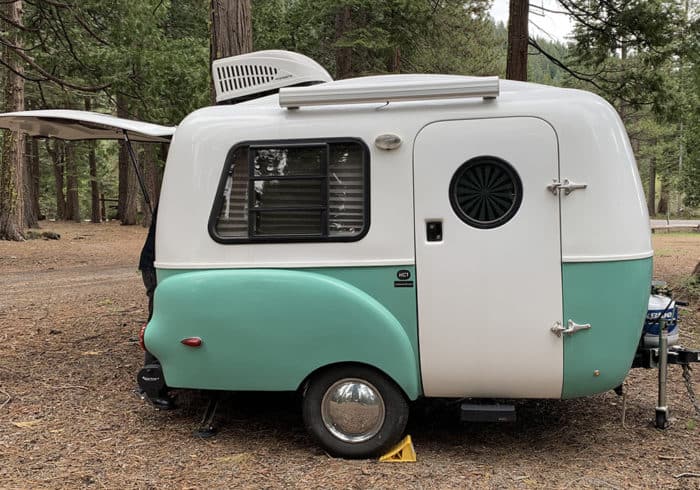What Are The Different RV AC Sizes?
While most RV air conditioners use the same size of opening to fit the standard 14×14 inch camper roof holes they are not all the same when it comes to cooling and electricity used.
Most RV AC units that are factory installed are 13,500 BTU, but some 5th-wheels and Class A RVs use the larger 15,000 BTU air conditioners.
Related Product: See how level your RV is using an App on your phone with the LevelMatePro Wireless RV Leveling System (click to view on Amazon)
The main difference between these two sizes is the electricity used and cooling power. A 13,500 BTU RV AC uses around 2,750 watts to start and a 15,000 BTU RV AC uses around 3,500 watts to start.
After using the initial high surge of power to start the compressor air conditioners start using fewer watts but you still need the electrical capabilities to cover that initial wattage.
There is a way to work around the high surge watts by installing a soft start (click to view on Amazon) but it requires some technical know-how.
If you want to be able to run an RV AC with a smaller generator (click to see review) or a portable solar power station (click to see review) getting a smaller RV AC is a good idea.
A small RV AC uses less power, weighs less, and doesn’t cause as much wind drag.
RV ACs that are smaller than 13,500 BTU can be hard to find but I’ve found a couple of fantastic roof mount options as well as a few window and portable air conditioners that can be used in a camper.
See Also: The Best Camping Gas Generators That Will Run Your RV AC
Smallest RV AC
Window Opiton
Portable Floor Option
Last update on 2024-04-25 / Affiliate links / Images from Amazon Product Advertising API
Smallest RV AC’s Reviews & Info
RecPro RV Air Conditioner Low Profile 9,500 BTU
One of the smallest RV AC’s on the market today is the RecPro 9,500 BTU.
It’s the same style as the standard roof mount RV AC units which means you won’t have to add any extra stuff to install it like you would if you get a portable or window AC.
You also won’t have to take it down and set it back up every time you move your camper.
The RecPro is rated for spaces up to 400 square feet. It’s plenty for most RVs, 5th-wheels, and travel trailers in regular summer temperatures.
The unit is small measuring only 21.5 inches wide, 39.5 inches long, and 9 inches high.
It weighs only 68 lbs.
It’s a non-ducted RV AC which means it’s made to only shoot air out of the inner ceiling mount that sits directly under the unit.
If your camper has AC ducts you can still use this RecPro if you cover the ducts.
This is a super simple RV air conditioner. It won’t work with the thermostat in your RV. Instead, it’s controlled directly from the ceiling panel or via the included remote.
The starting watts are only 1590 which means you should be able to use this with most 2000 watt generators without installing a soft start.
See Also: Best Portable Power Station/Solar Generator For Camping
You can also use this with portable power stations that can handle a surge of 2000 watts like the EF ECOFLOW Delta (click to view on Amazon).
The Delta has a surge watt rating of 3300 watts and can put out up to 1800 watts regularly. That means there’s plenty of power to run the RecPro 9.5K RV AC.
Note that using portable power stations is a great way to power your camper while boondocking but RV AC’s use quite a bit of power while running.
You may only be able to run it for a few hours even if the power station is being charged with solar power at the same time.
The RecPro RV Air Conditioner Low Profile 9,500 BTU can be installed on the roof of pretty much any RV, 5th-wheel, travel trailer, and even van or truck camper.
It has low surge watts which means most portable generators can run it and it has enough cooling power to keep you cool during the hot summer months.
If you’re looking for the smallest standard roof mount RV AC this is one of the best options out there.
PROS
- Low Starting Watts
- Lightweight
- Roof Mounted
- Made For Standard RV 14×14 Opening
- Doesn’t Need To Be Stored For Travel
CONS
- Non-Ducted Only
- Not Compatible With Thermostats
Window Mount Option
MIDEA 5,000 BTU EasyCool Window Air Conditioner
Another small RV AC option that doesn’t use a ton of power is to get a small window mount air conditioner that can be plugged into a standard wall outlet.
It’s not the most convenient option if you travel a lot but if you are a destination camper or a snowbird who spends months at a time parked in the same campsite this is a great choice.
Many people use window air conditioners in their homes but they also work in RV windows when given the proper support.
The Midea is available in a few different sizes but the 5,000 BTU version is the smallest and best for RV use, especially if you plan on powering it with solar power or a small generator.
The starting watts are only 1250 and the running watts are a low 446.
It weighs only 42 lbs but since it’s not roof mounted it will be a bit of a pain to set up and take down.
The dimensions are 16 inches wide, 13.19 inches long, and 12 inches tall.
See Also: 12 Volt Air Conditioners That Can Be Powered With Batteries
It can fit windows that are 23-36 inches wide and at least 13 inches tall. The necessary window mounting covers are included but you may have to make some modifications for RV windows.
For instance, a regular window can normally hold the weight of a 46 lbs air conditioner but RV walls aren’t that strong.
It’s recommended to build a tall support table or put something under it to take most of the weight so your RV doesn’t have to.
The small AC is controlled via dials on the front of the unit. It has 7 temperature settings and two fan speeds.
The MIDEA 5,000 BTU EasyCool Window Air Conditioner is a great choice for more stationary campers who spend summers working at national parks or being camp hosts.
It can be run with a small generator with surge watts of at least 1500 and even a small portable power station like the Jackery 1500 (click to view on Amazon).
As I mentioned before if you use a portable power station you will only be able to run an AC for a few hours even if it’s being charged with solar panels at the same time.
But sometimes a few hours of cold air is all it takes to get through a hot summer day while camping.
PROS
- Very Low Starting Watts
- Low Running Watts
- Uses Standard Wall Plug
CONS
- Must Be Taken Down To Travel
- Requires Stand For Extra Support
Portable AC Option
Midea 3-in-1 Portable Air Conditioner
If you have limited power in your RV or just need a little extra cold air during the hot summer months another option is to get a small portable air conditioner that sits on the floor.
The Midea portable air conditioner is the smallest of 4 different size options. It’s 8,000 btu and it’s rated to cool rooms up to 150 square feet.
It’s tall but not very wide measuring 13 inches long, 17 inches wide and 28.3 inches tall. It weighs around 60 lbs.
Most campers have large main rooms and a small air conditioner like this should fit perfectly in the corner.
All you need is a window you can open enough to let the exhaust hose out of. The exhaust hose is what lets all the hot air out so you want to make sure it’s set up correctly.
The hose is around 6 inches wide and 5 feet long. The Midea comes with a window kit that fits window openings that are 26.5 to 48 inches big.
If setting up the window kit in your RV seems like a little bit more work than you want to deal with you can always stuff some blankets in the opening for a quick seal.
See Also: How To Easily Replace An RV AC With A Fan, Vent, or Skylight
Because it’s a small air conditioner it’s also a dehumidifier and a fan. You will need to empty the water collection pan every now and again so make sure you pay attention to that.
The information about the watts used is a little confusing but it seems like this small AC uses around 900 starting watts and 850 running watts.
That kind of power consumption will be no problem for a standard 120V wall outlet if you are plugged in next to a home or into a small generator but for a portable power station you may only be able to run it for about an hour depending on how many watts it has.
If you are staying in an RV park to campground with power you can use this small RV AC 24/7. It’s quiet and there’s even a night mode that cuts the noise even more.
The portable AC is controlled via the LED display and button on the top or with the remote. The larger options can even be controlled with Alexa.
The air filter inside is washable and it’s recommended to keep it very clean for best results. This can be even more important when it’s being used inside an RV in a dusty campground.
The Midea 3-in-1 Portable Air Conditioner is another fantastic small RV AC that doesn’t use nearly as much power as the standard roof mount air conditioners.
It will take up some space and you do have to deal with the exhaust hose but installation is really pretty simple and you can secure it to the wall or put it in the bathtub for transport.
PROS
- Low Starting Watts
- Easy Installation
- Doesn’t Require Any Support Structures
- Quiet
- Uses Standard Wall Plug
CONS
- Must Be Secured For Travel
- High Running Watts

Can You Use A Portable AC In An RV?
Yes, you can use a portable AC in an RV so long as you have the space for it and you don’t mind having to store it somewhere when not in use.
Small air conditioners that sit on the floor or even in the window can be used in campers and the huge pro to them is most plug into a standard 120V wall outlet and can be powered with 2000 watt or larger generators and portable power stations.
See Also: Best Portable Quiet Inverter Generators For RV Camping
Window mount AC units require some sort of support stand in order to work in an RV window but all it takes is a few 2×4’s and a little time to set up.
Portable AC units that sit on the floor are also a fantastic option but you will still need to have a window opened enough to let the exhaust hose out.
If you dry camp in places where it’s hot during the day and you don’t want to have to get a huge generator (click to go to review) to run the RV AC on the roof a small portable RV air conditioner is a fantastic option.
Have any more questions about the smallest RV air conditioners? Leave a comment below.





This article was informative and helpful. Thank you.